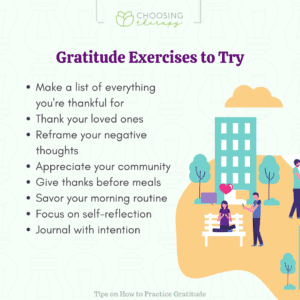Tips for a Happier & Healthier Life
Start your day with a glass of water.
Your body goes without hydration for several hours while you sleep. Drinking a full glass of water in the morning can aid digestion, flush out toxins, improve skin health, and boost your energy.
Begin with something positive.
Start your day by doing something that inspires you, like journaling, walking in nature, or pursuing other hobbies. Whether productive or relaxing, beginning your morning on the right foot can help cultivate a positive mindset and set the tone for the entire day.
Get plenty of sleep.
Sleep is as crucial as maintaining a healthy diet and exercising. It can enhance productivity, concentration, and overall health.
Get some fresh air.
Whether you go outside for exercise or read a book in the sunshine, you should get at least 30 minutes of vitamin D daily.
Get moving throughout the day.
Remember to take the stairs instead of the elevator, take short walks around your office, or ride a bike instead of driving. Vigorous exercise is important, but moving throughout the day will help keep you energized and benefit your mind and body.
Track your steps.
Tracking your steps can help you monitor your daily movement and motivate you to achieve a specific step goal.
Give your eyes a rest.
Constant computer screen focus can easily strain the eyes. To reduce the risk of tired eyes, look away for 20 seconds every 20 minutes.
Eat real food.
Real food consists of whole, single-ingredient, unprocessed foods free of additives. Adding these to your daily diet can improve health, manage weight, and boost energy.
Snack smart.
Make sure your snack choices aren’t weighing you down. Mixed nuts, veggies, Greek yogurt, or even a piece of dark chocolate are all great options that will keep you feeling satisfied. It’s easy to snack throughout the day mindlessly, so choose wisely!

Take your vitamins.
Multivitamins contain essential vitamins and minerals that are important for your health. Even if you eat a healthy diet, it can be challenging for your body to obtain all the necessary nutrients from food. Researching and finding a multivitamin that suits your needs and promotes your overall health is important.
Get some alone time.
Taking some time for yourself and being alone can truly have a positive impact on your mental health. It’s a great way to understand yourself better, figure out what you truly want, and start living a life that feels truly meaningful to you.

Try something new.
Join a book club, sign up for a class, and start cooking. Try something new at least once a month. Making a point to keep learning throughout your life can keep your mind lively and engaged.

Schedule your appointments.
Visit your dentist twice a year, ensure you get annual checkups at the doctor, and schedule recommended screenings for your age group. Prioritize your health.

Make time for your friends and family.
Spending quality time with friends and family is essential for overall wellness. As social beings, humans rely on social connections to maintain mental, emotional, and physical health. Setting aside time to be with loved ones can reduce stress, boost self-esteem, and lead to more positive decision-making.

Take care of your skin.
Building a daily skincare routine can help you maintain overall skin health or improve concerns such as acne, scarring, or dark spots. Find a cleanser, serum, moisturizer, and sunscreen to give your skin the love it deserves.

Limit blue light before bed.
The blue light emitted by your tech devices may cause those restless nights. The bright blue light emitted by your electronic devices, such as your smartphone and laptop, can disrupt your body’s natural sleep-wake cycle, making it difficult to fall asleep. To ensure a restful night’s sleep, it’s best to refrain from using these devices for at least an hour before bedtime. This small adjustment can help your body wind down and prepare for a peaceful and rejuvenating sleep. Phone or laptop away at least an hour before bed to set yourself up for a good night of sleep.
Manage your money.
Dealing with money concerns can be a significant source of stress for many individuals. Between saving for the future, managing home mortgages, and paying off loans, the financial burden can feel overwhelming. To alleviate some of this stress, it is important to create a prioritized list of your financial goals and establish a realistic budget. This will help you gain a sense of control and relief.

Practice gratitude.
We often focus on what we lack in life rather than appreciating what we have. By keeping track of the positive things in your life, you can begin to value your worth based on your successes instead of your shortcomings.










